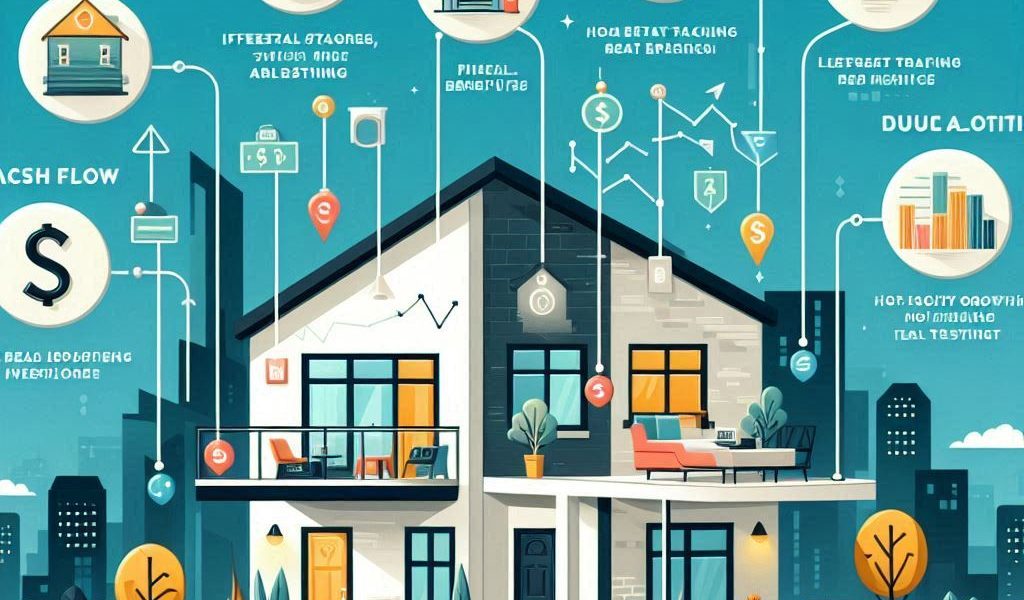Real estate investing is one of the most effective ways to build long-term wealth, and house hacking is an excellent strategy for beginners and experienced investors alike. This method allows you to live in a property while renting out parts of it to generate passive income, reduce housing costs, and build equity. In this guide, we will break down house hacking, its benefits, strategies, and steps to execute it successfully while ensuring compliance with legal and financial guidelines.
What is House Hacking?
House hacking is a real estate investment strategy where an investor purchases a multi-unit property or a single-family home and rents out extra space to cover expenses. The rental income helps offset mortgage payments, property taxes, and maintenance costs, ultimately reducing or eliminating housing expenses.
Benefits of House Hacking
1. Lower Housing Costs
By renting out portions of your home, you can significantly reduce your out-of-pocket housing expenses, allowing you to live for free or at a much lower cost.
2. Build Equity Faster
Since a portion of your mortgage is covered by rental income, you can focus on paying off your loan faster, increasing your net worth over time.
3. Experience in Real Estate Investing
House hacking provides hands-on experience in property management, tenant relations, and financial management, making it an ideal starting point for future real estate investors.
4. Tax Advantages
Investors can benefit from rental income deductions, depreciation, and mortgage interest deductions, reducing their overall tax liability.
5. Financial Flexibility
With reduced housing costs, investors can save money, reinvest in additional properties, or allocate funds toward other financial goals.
House Hacking Strategies
1. Multi-Unit Properties
- Purchase a duplex, triplex, or fourplex and live in one unit while renting out the others.
- FHA loans allow you to buy multi-unit properties with as little as 3.5% down, provided you live in one unit for at least a year.
2. Renting Out Extra Bedrooms
- If purchasing a single-family home, you can rent out extra bedrooms to roommates.
- This works well for young professionals or students who want an affordable living arrangement.
3. Short-Term Rentals (Airbnb)
- If local regulations permit, renting out a portion of your home on Airbnb or VRBO can generate higher rental income than traditional leases.
- Ensure compliance with local short-term rental laws and homeowners’ association (HOA) rules.
4. Accessory Dwelling Units (ADUs)
- An ADU (guest house, basement apartment, or garage conversion) can be rented separately while maintaining privacy.
- ADUs provide an independent rental income stream without shared living spaces.
5. Rent-by-the-Room Model
- Instead of renting an entire unit, you can rent individual rooms to multiple tenants, maximizing income potential.
- Ideal for high-demand rental markets like college towns and metropolitan areas.
Steps to Successfully House Hack
1. Determine Your Budget and Financing Options
- Explore mortgage options such as FHA loans (3.5% down), VA loans (for veterans), or conventional loans (5-20% down).
- Get pre-approved for a loan to understand how much you can afford.
2. Choose the Right Property
- Look for properties in high-demand rental areas with strong appreciation potential.
- Consider factors like proximity to schools, public transport, and job centers.
- Multi-unit properties and homes with extra living spaces work best.
3. Analyze Rental Income Potential
- Research market rents using platforms like Zillow, Craigslist, and Rentometer.
- Ensure rental income can cover mortgage, taxes, insurance, and maintenance.
4. Understand Local Landlord Laws
- Check zoning regulations, lease agreements, and tenant rights in your state.
- Follow Fair Housing Laws to avoid discrimination claims.
5. Find Reliable Tenants
- Screen tenants thoroughly by checking credit scores, rental history, and employment verification.
- Use legal lease agreements that outline rental terms and house rules.
6. Manage the Property Effectively
- Handle maintenance and repairs promptly to maintain a good landlord-tenant relationship.
- Consider hiring a property manager if you prefer a hands-off approach.
7. Plan for Exit Strategies
- Over time, you can convert the property into a full rental, sell for profit, or refinance to invest in additional properties.
Potential Challenges and How to Overcome Them
1. Tenant Issues
- Proper screening minimizes problems with rent collection and property damage.
- Have a clear lease agreement and enforce rules consistently.
2. Property Maintenance
- Set aside an emergency fund for unexpected repairs.
- Schedule regular inspections and maintenance.
3. Legal and Zoning Restrictions
- Research local short-term rental regulations and tenant laws before purchasing.
- Work with a real estate attorney if necessary.
4. Privacy Concerns
- Living with tenants can be challenging; set clear boundaries and house rules upfront.
- Consider properties with separate entrances or private living areas for added privacy.
Is House Hacking Right for You?
House hacking is ideal for those looking to: ✅ Reduce housing costs and build wealth through real estate. ✅ Gain hands-on experience in property management. ✅ Start investing in real estate with low initial capital. ✅ Achieve financial independence through passive income.
However, it may not be suitable for those unwilling to share their living space or take on landlord responsibilities.
Conclusion: Start Building Wealth with House Hacking
House hacking is a powerful strategy that allows investors to live affordably, earn rental income, and gain valuable real estate experience. By selecting the right property, managing tenants effectively, and ensuring compliance with legal requirements, house hacking can pave the way for financial freedom.
Key Takeaways:
- House hacking reduces housing costs while generating rental income.
- Choose properties with strong rental demand and appreciation potential.
- Follow local landlord laws, screen tenants, and manage the property efficiently.
- Use rental income to pay down the mortgage and reinvest in future properties.
By adopting this strategy, you can turn your primary residence into a wealth-building asset while maintaining financial flexibility. Whether you’re a first-time homebuyer or a seasoned investor, house hacking is a smart and practical way to grow your real estate portfolio




